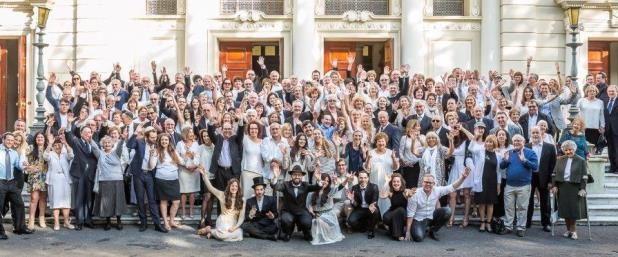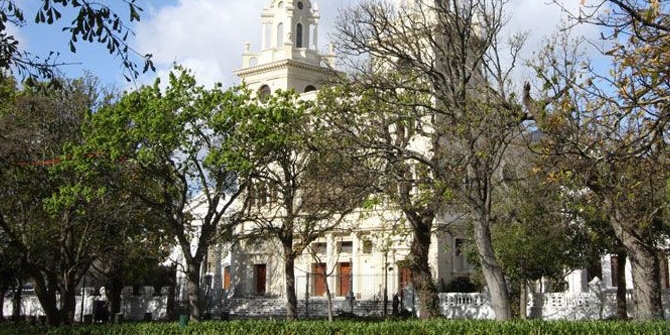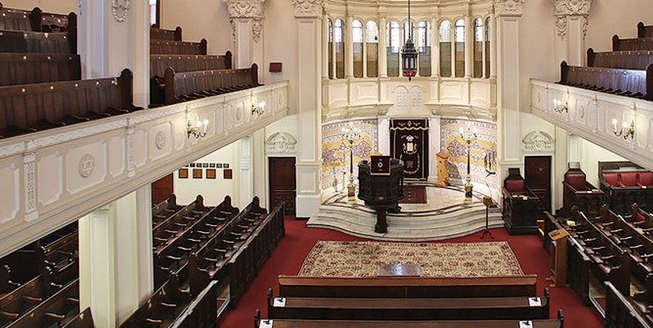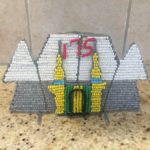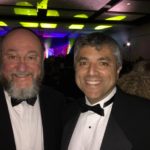The oldest Jewish congregation in South Africa, Cape Town’s Gardens Shul, celebrated its 175th anniversary recently. The community was established in 1841. The initial service was held in the house of Benjamin Norden and under the leadership of Joel Rabbinowitz the first synagogue in South Africa, the Gardens Shul, was erected in 1862. Philip Krawitz, a recipient of the prestigious Yakir award from Keren Hayesod-United Israel Appeal in Jerusalem and called “the unofficial mayor of the Jewish community in Cape Town,” in other words, the Cape Town Jewish Community chairman, spoke at the birthday celebrations.
Address by Philip Krawitz
Gardens Synagogue 175th Anniversary Celebration
March 31, 2016
The Role of Jewish Business in South Africa: “A Light unto Nations”
Cast your mind back a few years… You leave your Sea Point Apartment designed by Dennis Fabian and built by the Berman Brothers. You hop into your Toyota bought from the Sanks. You pop into Pick ‘n Pay (founded by Raymond Ackerman) for some groceries. You’re off to Artscape to watch a matinee starring Aviva Pelham in La Traviata. Thereafter you’re off to the Spur (don’t tell the Rabbi!) created by Allen Ambor. (By the way, they now serve kosher burgers.) Tomorrow you’ll visit the V&A where you’ll find an outfit for your granddaughter from Jonni Katz’s Earthchild. Perhaps you’ll even get a chance to get a new down jacket from Cape Union Mart, sneakers from Barry Selby’s “The Athletes Foot” or a suit from Arie Fabian’s Fabiani. And if you’re feeling peckish, you grab a cappuccino from Ian Halfon’s Balducci. Charge it all to Kantor & Koseff’s Investec Card. Fortunately your Liberty Life Pension cheque (thanks to Donny Gordon) will more than cover your expenses. Indeed you could be forgiven for believing that the whole world is Jewish!
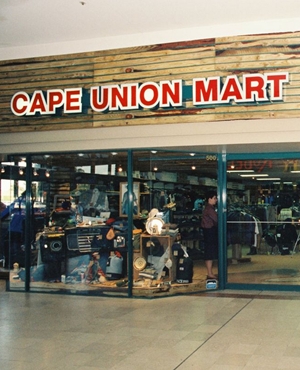
You wouldn’t be alone! When I first met Zuma in KZN [KwaZulu-Natal Province] before he became president, he asked me what the Jewish population was… ”around a million I suppose?” he enquired. Considering that at our peak of around 125,000 we were less than 2.5% of the white population and around .5% of the total population, we indeed punch much above our weight!
Introduction
Thank you for joining me tonight in exploring a subject, which, if truth be told should extend for a series of at least a dozen lectures in order to adequately cover the topic at hand. I would like to apologise in advance for leaving out many of the business leaders who have played a vital role in South Africa over the past 175 years. I hope I will not score too highly on the “faribel” index! I will simply endeavour to paint broad brush strokes in a small corner of a very large canvas. Right at the outset, though, I want to acknowledge the co-operation of Gwynne Robins and David Sacks for assisting me with research.
I will endeavour to start off with a little about the early pioneers. I will then focus on some of the giants of the 20th century covering the period when the Jewish population reached its highest numbers, and our influence and contribution appeared to be the greatest. Thereafter I will try and touch on Jewish contributions in the fields of agriculture, industry and the retail sector. I would then like to recognise the role of some of our leaders in the field of organised commerce. Hopefully, I will be able to tell you a little about my own experiences as a third generation family member of Cape Union Mart. Finally, I will speak about the contribution by our leaders to the well-being of our country and our very own Jewish Community. I hope that by that stage some of you will still be awake!
The Early Pioneers
Way back in the mid-19th Century, Jonas Bergtheil started accumulating land in the Cape Colony. He soon acquired nearly 200,000 acres of land and is probably the forerunner of Jewish prominence in the real estate industry. Typically, he paid attention to the welfare of fellow Jews in Europe who were coming under increasing pressure. He was a strong advocate of Jewish immigration to South Africa and brought out 40 German families who founded the New Germany settlement in Natal.
It is a fallacy to believe that Jewish immigration laid the groundwork for a mainly “smous” [itinerant Jewish peddler, from English Yiddish, “a German Jew,” from Yiddish schmus, “patter” and Ashkenazic Hebrew shmuos, “news or tales”] industry. The bulk of the immigrants were not simply unskilled hawkers earning money by peddling goods. It is true that the legendary Sammy Marks was renowned for literally turning a case of Sheffield knives into a fortune. However, according to Sarah Gertrude Millin in her role as a social historian, Jews started out as peddlers going “across the veld with a pack of goods on their backs”. However, a few months later they reappeared! “This time with a Cape cart and horse…often they opened a shop”. Many came with knowledge of tailoring, textiles, cabinet making and shoe making. There were also Jewish blacksmiths, pitch dealers, lime burners, lumbermen, gardeners and dairymen (like Tevya the milkman).
Many immigrants stopped off in London at the “Poor Jews’ Temporary Shelter” while waiting for a boat. About 40 percent were on their way to South Africa, and 90 percent of these were from Lithuania. Reports from the Shelter between 1895 and 1908 showed that of 9,408 respondents, 23 percent said they were in trade and commerce, 29 percent had been in the garment trades, 9 percent were shoe and boot makers, 7 percent were carpenters, 2 percent were in agriculture. The remaining 27 percent were butchers, bakers, printers, coopers, barbers, furriers, jewellers, locksmiths, bricklayers, cigar makers and painters.
In a paper given at the first South African Zionist Congress in 1905, Rabbi Hertz said that “it was essential that Jews at least should be taught the truth; that they themselves should no longer look upon themselves as interlopers, as exploiters; but rather as active participants in the up building of the national life”. “The smous had used his commercial and entrepreneurial spirit to turn his pack into a village shop, the tailor and cabinet maker had used their skills and entrepreneurial spirit to develop the fashion and furniture industries”.
Port Elizabeth became an important centre of the wool trade in which Jewish merchants, notably the Mosenthal brothers played a leading role. From bases in Cape Town and Port Elizabeth they set up a chain of trading stations in the interior of the Cape, usually manned by Jewish immigrants whom they had brought out from Germany. In those days there was no JEE (Jewish Employment Equity). Jews had to help each other.
The Mosenthals helped to stabilise the rural economy by providing long term credit to storekeepers and, through them, to farmers. Before the advent of commercial banking, the firm’s notes were widely accepted in the development of banking and the financing of diamond and gold mining.
In the 1840’s, Aaron and Daniel Depass, brothers from Britain, developed shipping, fishing and coastal trading enterprises in the South Western Cape. They also had interests in the newly discovered diamond fields in South-West Africa, and Daniel was one of the pioneers of the sugar industry in Natal.
Barney Barnato, possibly the first Jewish tycoon in South Africa, partnered with Cecil John Rhodes to found De Beers Consolidated Mines. They controlled the production and marketing of diamonds with a model that has endured to this day. On the discovery of gold in the 1880s, they did much to develop gold mines based on the wealth and skill they had acquired in diamond mining.
It was the legendary Samuel Marks and his partner Isaac Lewis who established a number of industries in the Pretoria area. Their endeavours covered production of dynamite for the mines, a distillery and even a glassworks. The steel plant which they established in Vereeniging was the forerunner of the state-controlled ISCOR.
20th Century Leaders
The 20th century in South Africa saw the rise of myriad Jewish leaders in the fields of commerce and industry. This was the age of real giants whose fame and fortune have endured. Sir Ernest Oppenheimer was born in Friedberg, Germany. He began his working life at 17 with a diamond brokerage in London and was sent to South Africa by his employer in 1902 at the age of 22. In 1927 he managed to wrest control of De Beers from Cecil John Rhodes and consolidate the company’s global monopoly over the world diamond industry. As an adult he converted to Anglicanism and was buried at St. George’s Church in Parktown. He was succeeded by his son, Harry, who went on to head up the Anglo American Corporation. Despite his father’s conversion, Harry had both a brith-milah and a bar mitzvah in the Kimberly Synagogue. Harry converted to Christianity when he married his wife. Despite their conversion, the Oppenheimers were often targeted as Jewish stereotypes.
In 1904 Issy Schlesinger founded the African Life Assurance Association. In 1949 he passed his empire to his son, John, who went on to become one of the doyens of the entertainment industry in South Africa. John Schlesinger was at the centre of the Johannesburg art scene from the 1960s to the 1990s. When John left South Africa in 1979 he donated the bulk of the Schlesinger collection to the University of the Witwatersrand. If truth be told, though, the real visionary of the insurance industry was Donald Gordon, who started Liberty Life in the 1950s with initial capital of just R100,000 [rand]. Donny, as he was colloquially known, was shocked by the meagre pension of £12 per month paid to his father after decades in productive employment. By the time he retired as Chairman of Liberty Life in 1999, the company was valued at over R40 billion and was the largest listed Life Assurance Company in South Africa. His innovative insurance products which incorporated growth from equity investments are probably the reason that many baby boomers are today retiring on decent pension pay outs. Donny was also the visionary behind the development of Sandton City, one of the world’s most successful shopping centres. In the year he retired, he was named “Achiever of the Century in South African Financial Services” by the Financial Mail.
In 2005 Gordon was awarded a knighthood by the Queen in recognition of his services to art and business. He also set new standards in the field of philanthropy by donating R100 million to set up the Wits Donald Gordon Medical Centre, the first private teaching hospital in South Africa. He also established the Gordon Institute of Business Science (GIBS) in Johannesburg. The Donald Gordon Foundation, formed in the 1970s, is believed to be the largest private charity in South Africa with projects in education, welfare, healthcare and wildlife.
The late Mendel Kaplan became recognised throughout the world as a great business leader, a great philanthropist and a great Jew. He transformed Cape Gate, founded by his father, Isaac, “from a modest business selling products like wrought iron and garden benches into a vast conglomerate producing its own steel”. Cape Gate became one of the largest privately owned companies in South Africa. Mendel financed numerous philanthropic projects in South Africa, Israel and in Jewish communities around the world. In 1980, together with his brother Robert, he founded the Isaac and Jessie Kaplan Centre for Jewish Studies at UCT. In 2000, the Kaplans established the SA Jewish Museum. Mendel’s Foundation also provided over 2500 bursaries for higher education for the children of Cape Gate’s employees.
As an industrialist Mendel set new standards in terms of corporate social responsibility. Cape Gate provided black employees with a range of services and aid programmes including a crèche to care for children of employees during working hours, interest-free loans for the purchase of their own homes, and scholarships for tertiary education of employees’ children. He also contributed much to the development of community projects in the Boipatong township, an area from which Cape Gate drew a large part of its labour force.
Although we Capetonians have claimed him as our own, Eric Samson spent most of his life in the steel business operating from his base in Johannesburg. He joined his father’s fencing and wiring business Pan Africa Staalhandel in 1958 and became managing director of the business in 1965 after it merged with competitor S. Machanick and Co. He then founded Machanick Steel and Fencing – Macsteel. By 1974 he had bought out his partners to become the company’s sole owner. He went on to build Macsteel into an industrial empire across three continents. Before divesting the American operation, Macsteel was one of the largest privately owned companies in South Africa.
Eric and his wife Sheila set up the Eric and Sheila Samson Foundation which has seen the family recognised as absolute leaders in the field of philanthropy. Eric serves on the board of the Nelson Mandela Fund as well as on numerous Jewish communal boards. He has been recognised as a leading philanthropist in the Jewish world by having the title of Honorary Life World Campaign Chairman of Keren Hayesod bestowed upon him. From hospitals to schools to all communal causes and beyond in South Africa, the USA and Israel, the Samson family is regarded as one of the most generous families in the world. Although in so-called retirement, Eric continues to busy himself with both business and Communal endeavours.
In KZN, formerly known as Natal, the Gundelfinger, Beare, Moshal, Gevisser and Frame families became legendary for their contributions to the South African economy. The Gundlefingers, who specialised in general importation, ironmongery and wholesale and retail trading were strong advocates of encouraging local “infant industries” through tariff protection. Karl Gundelfinger was president of the Natal Chamber of industries and later president of the South African Chamber of Commerce.
Aaron Beare joined a small family furniture factory in 1925. Beare Brothers were one of the pioneers of higher-purchase trading. They added household appliances to their stock and began to concentrate on retailing. They listed the company in the 1960s. Today the Aaron Beare Foundation is one of the largest charitable foundations in the country. Aaron’s son Jonathan has become a financial giant by investing in numerous companies run by young people, and his involvement in everything from property to the hotel industry, has seen him establish his own independent fortune. Like his father, he is also renowned for his philanthropy. The Moshals and Gevissers also listed their company and similarly created the Jakamar Trust, which is one of KZN’s major charitable foundations. I am privileged to be involved with John Moshal on the National Executive Committee of the South African Jewish Board of Deputies, and am blown away by the hundreds of bursaries awarded by the family both in South Africa and in Israel.
Philip Frame became a legend in the textile industry after launching his manufacturing operation in Durban in 1928. By 1960 the Frame organisation had become a series of listed major industrial companies operating mills, factories and sales offices throughout South Africa. When Philip Frame died in 1979 the Group’s workforce numbered way over 30,000. It is reputed that Philip Frame claimed that sorting out his estate would take as many years as it took to build it!
Now let us look at the Cape. In the early 1900s Ellis Silverman emigrated from Latvia to Cape Town. A qualified tinsmith, he soon began working in Saldanha Bay in a factory making the tin cans that were being used to preserve rock lobster. In 1905 he partnered with a local boat owner, James Kasner, to establish the Saldanha Bay Canning Company. Robert Silverman, born Robert Milliner, was adopted by his uncle, Ellis Silverman, at the age of 6. He formally changed his surname to Silverman. After the war Robert returned from Italy and in 1949 married Bella. They went on honeymoon, during which time Robert honed his studies in technology. When he returned to South Africa he built a fishmeal factory which became the basis for the growth of the Saldana Bay Canning Company.
In the early 1960s they acquired a floating fishmeal factory known as the Willem Barendz. This proved to be an extremely successful venture and was listed as W. Barendz. Unfortunately, the authorities forced them to give up this venture as the boats were catching too much fish. Robert then partnered with Rudy Frankel to form Swafil in Walvis Bay. Politics forced them to exit Namibia in the late 1970s. Today, Saldana Bay Pilchards racks up sales of over 30 million cans per annum. This equates to one tin of pilchards being consumed every second of every day throughout the year by someone, somewhere in South Africa! In the early 1990s Robert set yet another example in corporate responsibility by creating a scheme to assist all first-time homeowners in his company to buy their own homes. They established a clinic for their employees, where their employees and their children receive primary healthcare. The Silverman family are also recognised for their decade’s long involvement with Jewish xommunal causes and their generosity to our Community.
Jewish business leaders in the Western Cape became synonymous with the retail industry. Although originally founded by Max Sonnenberg in 1931, the late David Susman was responsible for building Woolworths into the model company that it is today. Woolworths has been a leaders in quality and technology and its “Good Business Journey” has earned it recognition as one of South Africa’s most admired companies. Woolworths led the recent charge into overseas markets where it is achieving considerable success. In 1948 David Susman volunteered as a fighter pilot in the fledgling Israeli Air Force. His lifelong association with virtually every Jewish cause in our province is evidence of his commitment to our community. He preceded me as chairman of both the United Herzlia Schools’ and the United Jewish Campaign’s Boards of Trustees.
Morris Mauerberger started off selling door to door—mainly at the back doors—of homes in Sea Point. He worked on commission earned by collecting weekly installments from servants in the various homes. When Gus Ackerman needed funds to start a business, he went to Morrie whose own business had prospered and had developed as shippers and traders of stature. Clever Morrie agreed to finance stock to the extent of £1,250, but also wanted 10% of sales from the new stores. Morrie also funded Sam Kirsch and Leon Segal who opened stores of their own. Eventually the three Mauerberger-funded men went into partnership to launch South Africa’s first chain store group. After much debate, and clearly because anti-Semitism remained a feature of their lives, they decided to call their group Ackermans—a name that could be Afrikaans, coloured or white as easily as it could be Jewish.
They introduced the concept of pricing at 1/11—1 shilling and 11 pence—because it sounded cheaper than 2/- and also because it obliged sales assistants to ring up the sale and open the till to extract change. After 4 years, 15 stores had been opened and the Group continued to expand thereafter.
Greatermans was created to be “greater than Ackermans.” A young Raymond Ackerman learned important lessons from his UCT lecturer, Professor Hutt, who helped him formulate his famous “four legs of the table.” Essentially, they covered profits and expense control, giving customers the merchandise they wanted, social responsibility, and people, including family and employees. After opening 89 Checkers stores within the Greatermans Group, Raymond was fired at the age of 35 for his revolutionary ideas, especially the concept of price cutting.
Jack Golden had started a business called Pick ‘n Pay and was happy to sell his 3-store chain for R620,000. Raymond was definitely the father of South African consumerism and his concept of “the Consumer is Queen” certainly resonated with women. His ongoing fight against price fixing, his battle for lower fuel and bread prices, and his introduction of the “Hypermarket” concept made him a legend in his time!
The rest is history, and today Pick ‘n Pay operates some 1,200 stores in South Africa with more than 100 in the rest of Africa. Their turnover exceeds R70 billion and they employ more than 70,000 people.
Another doyen of the Cape retail scene was Stanley Lewis. Jewish traders were known as “shinis.” When 4 of them got together they decided to name the group after the four shinis, and so it became Foschini! Foschini is today an enormous public company whose board is chaired by Michael Lewis, Stanley’s son. They have recently acquired a number of overseas chains and are clearly on their way to becoming an international retailing force to be reckoned with.
Sydney Press joined the Edgars Group as a temporary employee when Edgars moved to Cape Town in 1935. In 1946 Edgars went public following a period of strong growth under Sydney’s leadership. By 1990 the company’s turnover had reached R2 billion and continued to experience stellar growth thereafter. Unfortunately, in the latter years, the Group has performed poorly under new owners, but still remains a force to be reckoned with.
Another major retail chain, Truworths, is currently headed up by Michael Mark, who has set new standards of excellence in the retail arena. Benchmarked against leading international companies, Truworth’s metrics outperform most of its global peers.
In the banking sphere, two nice Jewish boys, Bernard Kantor and Stephen Koseff, created Investec, which has established itself as the leading South African bank, catering for high net-worth individuals. They have expanded internationally and are universally recognised for the excellence of their innovative banking and financing products. Another bank with a Jewish founder and an ongoing Jewish flavour is Sasfin, headed up by Roland Sassoon and his heir apparent, his son Michael.
Take the property field and think of the incredible performance of Gerald Leissner, who heads up Apex. Think of the healthcare industry and consider the incredible achievements of Adrian Gore in building Discovery into the market leader in its field. I hardly know anybody who doesn’t have Discovery as their health provider of choice! Like so many of his peers, Adrian continues to take an active role in Jewish communal life and currently plays a leadership role in Jewish education in Johannesburg.
Although his major endeavours emanated from his Swaziland ventures, one cannot ignore the huge impact of Natie Kirsch, who was ranked the 435th wealthiest person in the world in 2015 by Forbes Magazine. His empire spans many countries, yet his heart is still very much in South Africa.
The influence of top business leaders like Brian Joffe, Adrian Gore, Stephen Koseff, Colin Coleman and others, on the government of the day should not be underestimated. More the pity that their sage counsel is often ignored.
Indeed, in everything from stockbroking to farming to winemaking to retailing, insurance, banking, clothing manufacture or real estate, the Jewish Community of South Africa has made an incredible contribution.
The CEOs
Whilst there has been great recognition of many outstanding Jewish businessmen, little recognition has been given to the women who have played such important roles in supporting the growth of their husbands’ endeavours. For example, Wendy Ackerman has for many years served on the Pick ‘n Pay board and, as Raymond readily acknowledges, she played an instrumental role in supporting him when he was fired and took the huge risk of buying 3 stores and starting Pick ‘n Pay. Without a doubt, it is unlikely that Raymond would have taken this risk without the support of Wendy.
Just a fortnight ago, Wendy was acknowledged at a special concert marking a milestone birthday. Outstanding artists from around the globe who had benefited from Wendy’s largesse had been flown in to perform as a “thank you” to her. For me the most moving moment was when her daughter Suzanne asked all those present in the auditorium who had been helped by Wendy to stand up. I nearly fell out of my chair when I saw about a third of the hundreds present rising to acknowledge Wendy!
Sheila Samson is another extremely powerful force behind the throne. Eric seldom makes any major move without Sheila. When it comes to philanthropy, Sheila regularly pushes the bounds of Eric’s incredible generosity even further.
Indeed, many wives of top business leaders should be termed CEOs—“Chief Emotional Officers.” They keep the families together and manage inter-generational challenges with their unique EQs—“Emotional Intelligence.” Their advice is often invaluable, especially in the field of human resources!
In a number of cases daughters have stepped into the breach to play leading roles in managing family empires. Suzanne Ackerman is director of transformation for Pick ‘n Pay, and plays a key role in positioning the company for acceptance in the new South Africa. Alison Katzeff watched her dad Sam become a formidable force in the liquor industry with the Drop Inn Group. Although Sam sold out in 1992, the family retained the properties and Alison now manages the family affairs, including their substantial property portfolio. Alison, who has an MBA degree, not only occupies herself with her family interests, but has also taken leadership roles, both as chairman of United Herzlia Schools and as chairman of the United Jewish Campaign. Alison’s feminine touch has brought a whole new dimension to the roles that she has fulfilled and I dare say that she has once again proved that often the best man for the job is a woman!
Another example of the leading role that Jewish women are playing in the South African business scene is that of Tanya Golan, who, together with her husband Hagai, established Portfolio Bureau. They recently sold a 50% share in the business to Anchor Capital for R125 million. Whilst building a substantial company, Tanya, like Alison, still found time to chair Herzlia School’s Board of Governors. In my own business, two of my daughters serve as directors and play active roles in the company’s operations.
Organised Commerce
One should never forget the role of a number of Jewish business leaders in leading organisations like the Chambers of Commerce and Chambers of Industry. Mike Getz was a leading light in the Chamber of Industries. Leaders like Lassie Salber, Hymie Wolffe and Robbie Stern all headed up the Cape Town Chamber of Commerce. To their credit they consistently opposed apartheid and regularly confronted government in respect of their discriminatory laws. I was proud to be numbered amongst the ranks of such illustrious past presidents and went on to become president of SACOB (the South African Chamber of Business). When called before the Truth and Reconciliation Commission I had the opportunity to produce evidence of the consistent stand that our chamber had taken over many decades against racism.
Repairing the World
One can never underestimate the role played by Eliot Osrin who served on the boards of many companies such as Clicks, Foschini, Atlas, Gerber Goldschmidt, Freddy Hirsch, Heneck Sacks and others. He played a leading role in alerting companies to their corporate social responsibilities and their philanthropic duties. Thanks to Eliot, many top Jewish businessmen were encouraged to set up charitable trusts which today are the lifeblood of Cape Town’s Jewish Community.
Raymond Ackerman founded the Raymond Ackerman Academy of Entrepreneurial Development and Donny Gordon, as previously mentioned, founded the Gordon International Business School (GIBS) at Wits. The Samsons have funded numerous schools and Eric’s ongoing involvement as a trustee of the Nelson Mandela Fund sees him and his family playing a leading role in the field of philanthropy. Charitable trusts and foundations such as the Jakamar Trust, the Donny Gordon Foundation, the Mauerberger Foundation and the Eric and Sheila Samson Foundation give evidence of the extent to which Jewish business leaders set an incredible example of ongoing philanthropy. Needless to say, the generosity of Cape Town business leaders is the reason why Cape Town has such a well-organised and well-funded Jewish infrastructure.
Eliot Osrin persuaded business leaders to set up charitable trusts by assuring them that in so doing they would achieve a little bit of immortality. An example of how true this is, is the fact that very few people remember the businesses started by Morris Mauerberger, but his name lives on eternally through the Mauerberger Foundation.
My Story
Permit me a moment of self-indulgence as I tell you a little about the Cape Union Mart story. My late grandfather Philip Krawitz founded P Krawitz and Company in Johannesburg in 1933. He moved to Cape Town in the 1940s and decided to rename his company “The Mart.” The Registrar of Companies felt that was too generic, so he then suggested “The Union Mart,” acknowledging the Union of South Africa. When that, too, was rejected, he added the prefix “Cape,” and so the “Cape Union Mart” was born. My grandfather’s failing health forced my dad to leave his job at the OK Bazars where Miller and Cohen had given him some excellent training. Unfortunately the war broke out and my dad, Arthur, was conscripted into the army. When he was demobbed in 1945 he returned to a literally bankrupt business.
My dad pleaded with his creditors to allow him time to repay overdue debts rather than putting him into liquidation and getting a penny in the pound. My late mother worked tirelessly by his side, and together they struggled to get the business back on its feet. We lived in a R20 a month apartment in Sea Point, and my mom and dad shared a third-hand motorcar for more than a decade. Everything my parents had, went into sustaining the business.
In 1970, while I was in my final year at UCT, my dad suffered a heart attack and like Bill Gates, Richard Branson and Steve Jobs, I became a university drop-out and went to run the business. My dad was terrified of my ambition and nearly suffered another heart attack when I suggested that we open a second store in Parow. Fortunately, our overdraft was coming down and the building which my dad had bought with no less than four bonds, was nearly paid off. This allowed me to use available cash flow to start growing the business. Along the way we had bought a uniform company which was doing really well and we then purchased the Hepworths manufacturing operation with its 22 workers, to provide us with a regular supply of traffic, fire and security clothing. We named this factory “K-Way” as my dad was always known as “Mr. K” and usually insisted on doing things his way.
Fast forward to 2016 and our factory now employs some 230 people and produces more than 500,000 high tech garments per annum. The Group employs more than 3,000 people and we have just opened our 200th store. The Group now comprises four chains, namely Cape Union Mart, Old Khaki, Poetry and Tread+Miller—our new baby focusing on urban footwear.
I feel very privileged to have two of our daughters actively involved in the business, both in executive capacities and as directors on our board. We have made the leap from entrepreneurial to professional management by employing a wonderful CEO by the name of André Labuschaigne. Indeed, as is evident in South Africa’s history, Jews and Afrikaners get along pretty well together.
I am still actively involved in the business, but have now dedicated much of my time to both Jewish communal affairs and a wonderful black upliftment organisation known as Ikamva Labantu.
In Summary
Without a doubt, Jewish business leaders have made an incredible contribution to the South African economy. They have created hundreds of thousands of jobs and are generally known for their high standards of corporate responsibility. Jewish employers are leaders in education and training of their staff, and most are regarded as model employers. Their philanthropic endeavours set new standards of generosity, and despite numerous challenges, they remain committed to the future success of South Africa. Indeed, they have fulfilled the biblical injunction of being a light unto nations and an example for all others to follow.
§§§
Vilnius Jewish Community member Grant Arthur Gochin was at the event and shared some of his snapshots. The first is a display of African beaded napkin holders passed out to women at the event. The next is Grant with Chief Rabbi Mirvis. Last but not least, our own Grant with his cousin, South African MP Darren Bergman.


